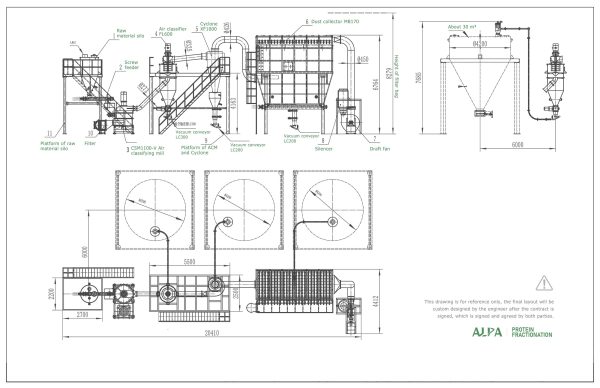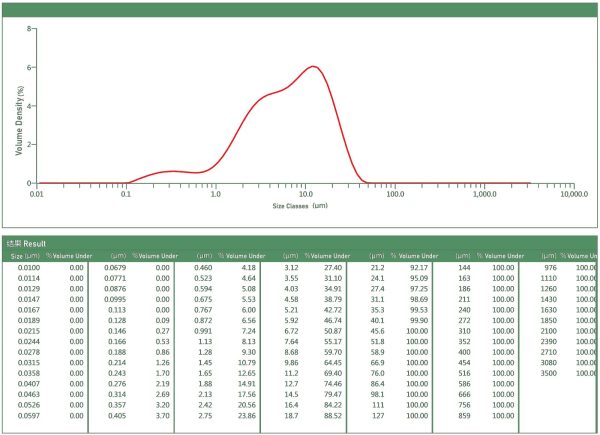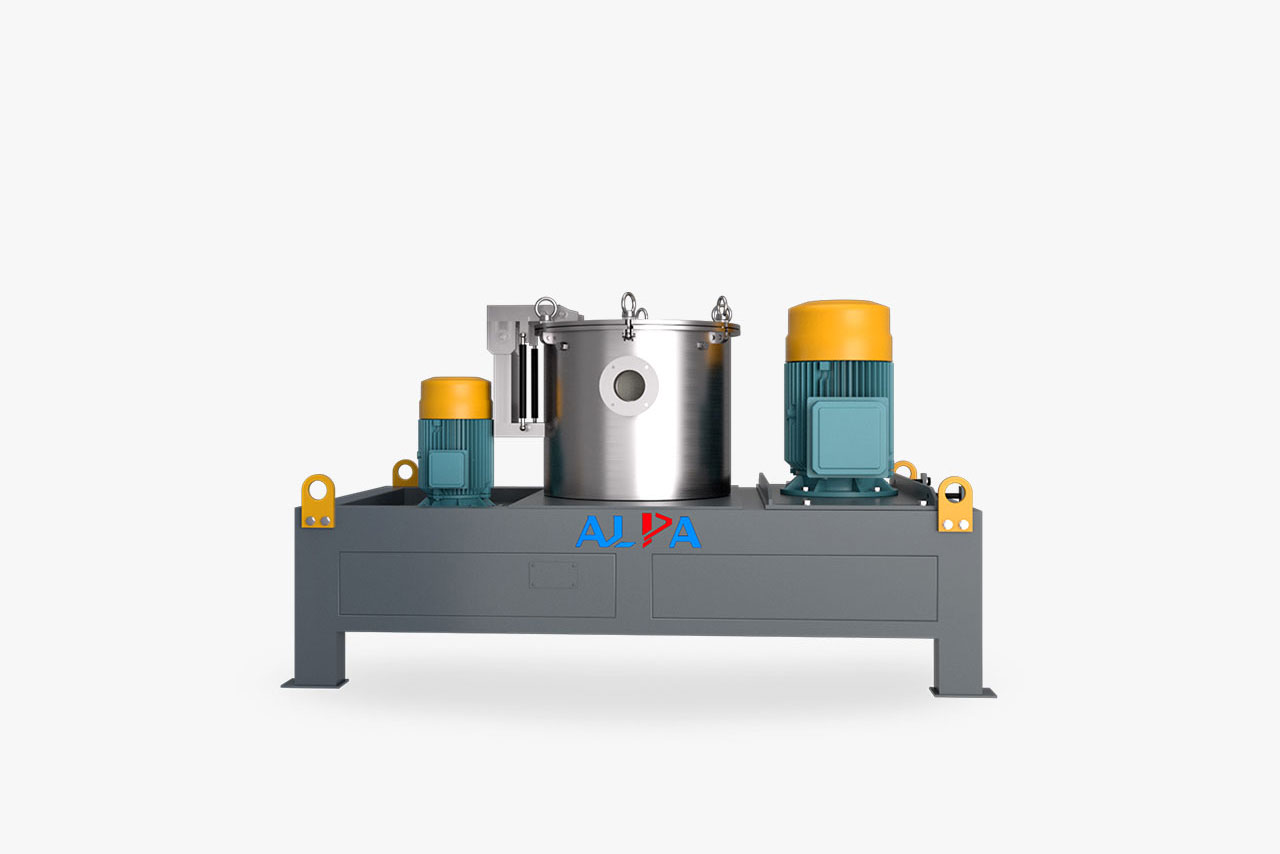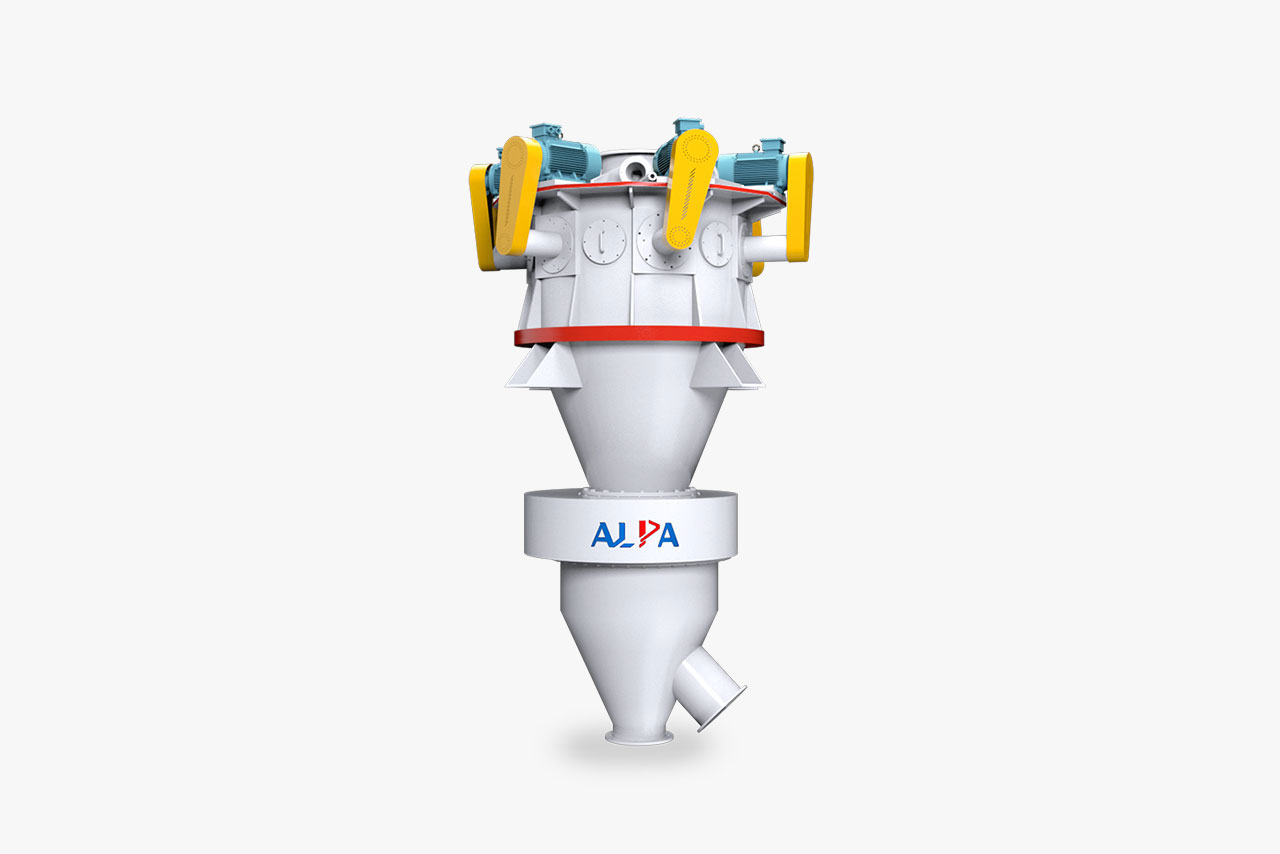ALPA POWDER TECH
Protein
In a protein shifting process, the legumes are finely ground using an air classifying mill to disintegrate the endosperm and liberate the protein and starch.
The Air Classifying Mill is one of the most effective size reduction systems for fine milling of dry legumes to the appropriate particle size, ideal for separation. The ground materials are pneumatically conveyed to an Air Classifier which separates the coarse, low protein material from the fine, protein rich material.
Brief introduction of protein-fractionation dry method process of ALPA
Beans that are high in original protein are usually used, including pea, mung bean, broad bean, chickpea, lentil, red lentil and green bean. Take the fractionation of pea protein as an example:
1. Peel peas after impurity removal.
2. Feed peeled peas to mill for ultra-fine grinding. Through the built-in separating device for classifying, the powder that meeting particle size requirements is output, generally D90 10-65 microns (depending on original protein content of beans from different country of origin).
3. The milled pea powder is transported to a special classifier and separated into protein-rich part and starch-rich part according to the difference in specific gravity and particle size. The classifying of protein-rich part and starch-rich part is realized by adjusting operating frequency, feeding volume, conveying air volume, air flow speed, secondary air inlet angle, air volume and other parameters of classifier.
The protein-rich powder produced by this method is obviously superior to the wet processed protein rich powder in terms of functional components
1. Food grade process and production line are adopted, 304 stainless steel material. Beans are milled and separated by physical purification method. There is no impact on pea tissue composition, no additives and no chemical reaction in the whole production process, so as to ensure the natural quality of pea protein. The protein-rich powder produced by this method is obviously superior to the wet processed protein rich powder in terms of functional components, and also reduces the pollution of water source and environment.
2. The system adopts explosion-proof design to avoid possible explosion risk in the production process and ensure safety and stability of production.
3. ALPA can provide a complete set of production line and processes from raw material conveying, dehulling, protein fractionation process, product conveying and packaging. It has completed many domestic and abroad projects, own rich project experience and mature equipment to solve actual production requirements of customers.
Higher protein-fractionation efficiency and protein purity
Usually, we grind Beans to 15-45micron(depends on original protein content of beans from different country of origin) by Mill, and then separate powders to obtain Protein-rich and Starch-rich parts by Air Classifier.
For example, the Pea(usually original protein content is 19-25%), in the milled powder, we can reach: Protein-rich: 35-40%, Starch-Rich: 55-60% in the whole product. And, there are 55-60% pure Protein content in the Protein-rich part. It means, for 100KG Bean product, there are around 40KG Protein-rich part, and 22-24KG Pure Protein finally.
(Different original protein content in the beans, has a direct impact on the yield of final protein product.)
Milling equipment
According to the characteristics of different Legumes proteins, adjust to the most suitable crushing particle size
Peas, mung beans, broad beans, chickpeas, lentils, red lentils, green beans, etc. are coarsely crushed, and then sent to ultrafine grinding equipment for fine grinding.
Material is impacted by the high-speed rotating grinding disc, subjected to centrifugal force and collides with the grinding ring gear, and is subjected to various comprehensive forces such as shearing, friction and collision to finished grinding.
Build-in classifying device, product size D90: 10-35 microns(adjustable), good grain shape and narrow particle size distribution.
Compliant with GMP, C-GMP, FDA certification requirements, easy cleaning and disassembly.
The whole system is sealed and smashed, with less dust, low noise and clean and environmentally friendly process.
The control system is controlled by the PLC, easy to operate.
Classifying equipment
Realizing physical separation of protein-rich powder and starch-rich powder
The separation point between protein and starch is about D90 38um.
Air classifier works with cyclone separator, dust collector and draft fan to form a complete classifying system. The material would be fed from bottom part of air classifier and up to the classifying chamber by air flow from suction fan. The classifier wheel with high-speed rotation would create a strong centrifugal force to separate coarse and fine powder. Qualified fine powder would across the wheel impeller then enter the dust collector. Oversize powder fall along the wall of chamber to the inlet of secondary air. The secondary are flow would disperse them further and separate coarse and fine powder. Fine powder would go up for the secondary classifying, while coarse powder would fall and discharge from the bottom outlet.The oversize powders return to the grinding area, secondary grinding.
Multi-rotor structure to meet large capacity requirements.
Each classifying rotor is equipped with a velocity sensor so that the rotor speed is controlled through frequency, enabling flexible adjustment to particle size distribution.
Secondary washing air flow will be free to inhale, accelerate material dispersion.
The control system is controlled by PLC program, which is easy to operate.




